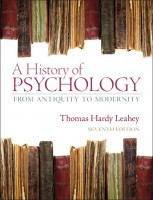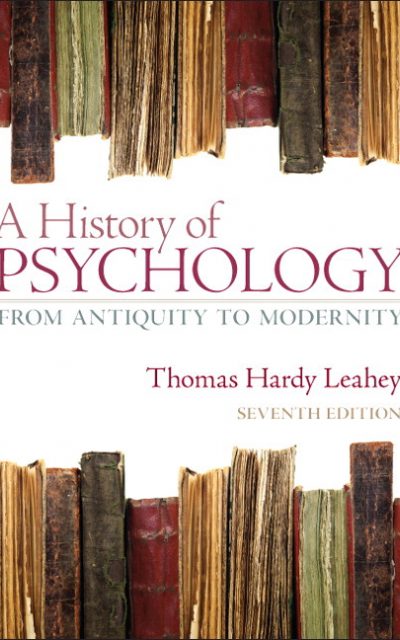 Author: Thomas Hardy Leahey
Author: Thomas Hardy Leahey
Publisher: Pearson – 557 pages
Book Review by: Sonu Chandiram
This seventh edition of A History of Psychology From Antiquity to Modernity is a combination of materials in the previous editions of The History of Psychology as well as A History of Modern Psychology.
The reason for this integration as the author explains, is that since 1980 when the first edition of this book appeared, there has been a shift in focus in the history of the sciences: from focus on the origin of a scientific field to focus on the prehistory of a field, before it became professionalized.
Psychology started at first as the study of the soul. It is a combination of psyche, the Greek word for soul, and logos which means study. The combined word psychology was coined as early as the seventeenth century but became widely used only in the nineteenth century.
Psychology was in the beginning, a branch of philosophy which principally deals with questions regarding the human soul and human nature. Later, it evolved into what the author calls “folk psychology,” a set of untested thoughts, beliefs and ideas developed by various people about why people think and behave the way they do.
It was only during and after the Scientific Revolution that such ideas were tested as hypotheses and the results were measured and recorded, that psychology became recognized as a science.
Studies of physical phenomena (chemistry, physics, and others) became accepted much faster as sciences than studies relating to human thought and action (sociology, psychology, and others).
The coverage of this book on the historical origins and development of psychology starts with an introductory overview of science, history and psychology in chapter 1, which looks into how to understand the distinct nature science (including psychology) and its history.
Following this initial look, the rest of the material for this book of fourteen chapters, is divided into five Parts, respectively: Background to Psychology (chapters 2 and 3); Constructing the Modern World (chapters 4 through 7); The Founding of Psychology (chapters 8, 9 and 10) ; Psychological Science in the Modern World (chapters 11 and 12); and Applied Psychology in the Modern World (chapters 13 and 14).
Here’s a snapshot of topics you will find (to plan your exploration) on the 2500+ years of the history of psychology as discussed in this book, by chapter titles:
- Science, History and Psychology
- The Legacy of Ancient Greece
- Antiquity: 323 B.C. to 1000 C.E.
- The Pre-Modern World: 1000 C.E. to 1600 C.E.
- The Scientific Revolution
- The Enlightenment: 1700-1815
- The Ascent of Science: 1815-1914
- The Psychology of Consciousness
- The Psychology of the Unconscious
- The Psychology of Adaptation
- Behaviorism: 1892-1956
- Cognitive Science: 1956-2000
- The Rise of Applied Psychology: 1892-1939
- The Psychological Society: 1940-2000
This extensive and intensive story by Thomas Leahey on how psychology began, developed as a science, and grew into many specializations is fascinating, to say the least. It is instructive if you are a practitioner or student of the field, or even if you are a lay person with an interest in this field.
In his concluding thoughts, Leahey observes two opposite trends. One is a continuation of disintegration in the field into increasing specialization, with sub-fields and sub-sub-fields organized around studying smaller and smaller portions of a subject. This also results in overlap of study by other specialists.
The other trend is integration, not among psychologists, but between psychologists and other specialists outside psychology. He remarks that some of the fastest-growing research areas these days are interdisciplinary. Here are some examples:
- Behavioral economics (psychologists and economists)
- Cognitive neuroscience (psychologists and physiologists)
- Artificial intelligence (psychologists and engineering)
- Evolutionary psychology (psychologists, anthropologists, and biologists).
Thomas Hardy Leahey is Professor Emeritus at Virginia Commonwealth University







